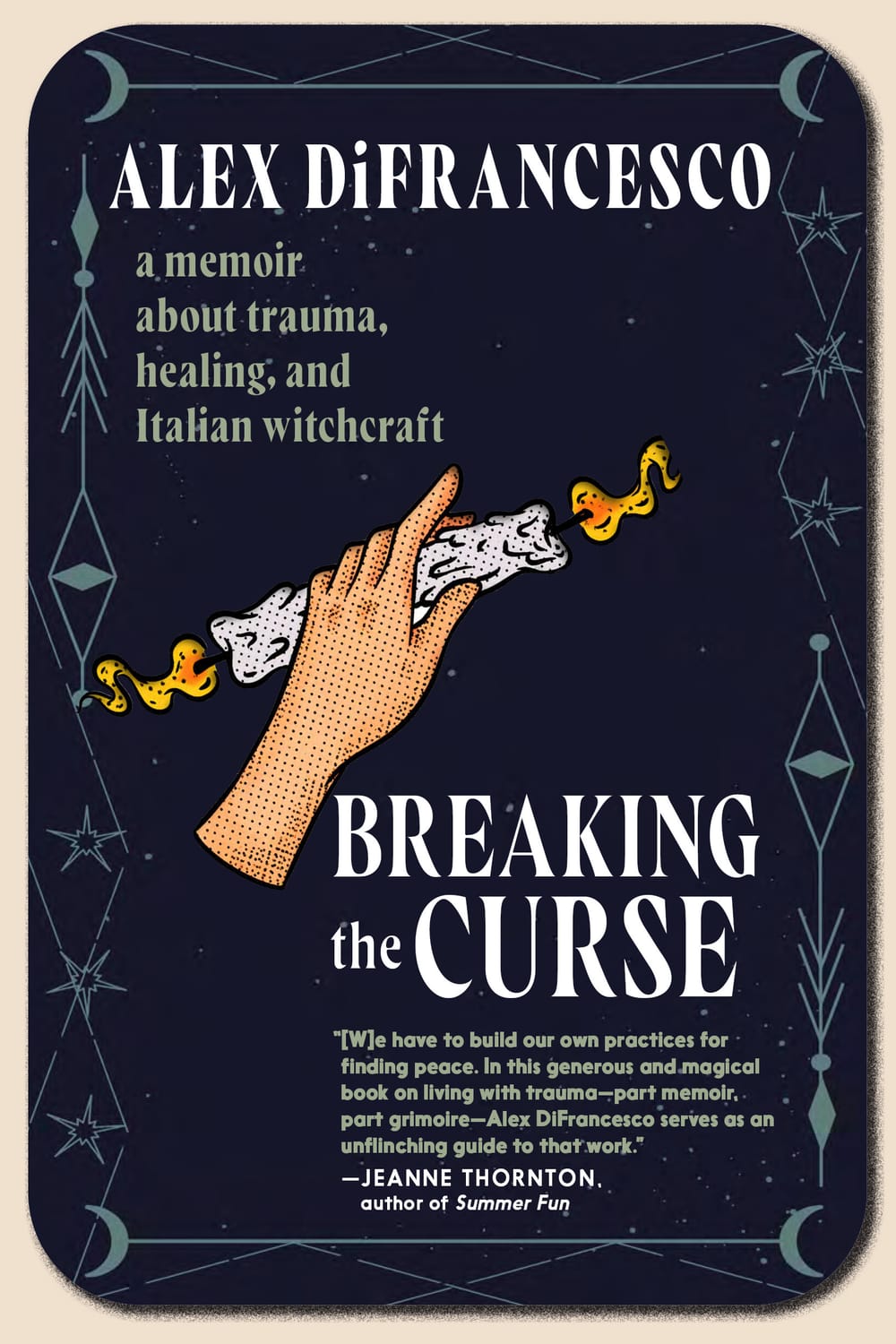Stay in the Loop
BSR publishes on a weekly schedule, with an email newsletter every Wednesday and Thursday morning. There’s no paywall, and subscribing is always free.
A magical memoir of perseverance
Breaking the Curse: A Memoir about Trauma, Healing, and Italian Witchcraft, by Alex DiFrancesco

In their powerful new memoir, Breaking the Curse, Philly-based author Alex DiFrancesco tells the harrowing story of surviving a sexual assault that occurred when they were enrolled in a graduate writing program in Ohio. The attacker tried to discredit DiFrancesco by turning their literary community against them and attempted to sue them after DiFrancesco courageously wrote an essay about the rape. In the aftermath of traumatic violence and compounded estrangement, DiFrancesco seeks healing and transformation through a unique spiritual journey involving magic and an ancestral connection to Italian witchcraft.
The book incorporates tarot card imagery, recipes, spells, and reimagined self-help activities, such as “In this blank space, cut out words that trigger you in this story and make something with the rest.” This inventive approach directly relates to the narrative and thought-provoking questions DiFrancesco explores.
A non-linear narrative for a non-linear experience
Like a deck of tarot cards, the narrative offers numerous stories within stories, demonstrating the complexities and interconnectedness of trauma. The first chapter of the book introduces multiple storylines. Each introductory line begins with, “If you are following the story of…," resembling the language of a choose-your-own-adventure novel, which prepares the reader for the multiple layers they are about to encounter and does so in a self-aware tone that reveals the author’s analytic wit and bold voice. “This is a story of someone who, despite the Jenga-tower of these things, did not collapse.”
The prismatic structure forms a spiral of processing trauma, which, in DiFrancesco’s exacting approach, allows for close examination of what happened and their search for a pathway forward.
DiFrancesco writes, “I think, often, that trauma never ends. You learn to deal and cope with it, but you never know what will put you back to square one. You never know what is lurking somewhere innocuous, waiting to rekindle all the feelings that you thought you had done the work to get over. You never know what’s going to take you, one day, from someone quietly enjoying the life they’ve built since the trauma, to someone who is full of murderous rage. Progress, in so many ways, seems like it should be linear. But it’s not, not with trauma.”
DiFrancesco proves trauma is nonlinear. It is messy and complex. Many memoirs I’ve read from more commercial publishers tend to compress trauma into something flat and malleable, with a tidy, mess-free formulaic arc that lands on a high, often sentimental note. This usually feels gimmicky and inauthentic to me, which is one of the reasons I appreciate DiFrancesco’s fierce candor. They do not force the story into overdone conventions, while also landing on a hopeful note, but in a way that grows from their exploration. This artfully crafted narrative culminates in a way that lives up to the book’s title.
Honest complexity
DiFrancesco also wrestles with how, in an effort to protect ourselves, we put our personal beliefs and actions at odds by involving our broken legal system, which minimizes the complexities of trauma, mental illness, addiction, and human emotion, making an oversimplistic duality of good and evil. This quandary (which I also examine in my own memoir-in-progress) often goes unexplored in other books.
The book reveals how a non-binary trans-masculine person was repeatedly gaslighted. First, by their family who refused to recognize their gender identity. Then, by mental health professionals who misdiagnosed them. And finally, by someone they trusted, who attacked them and refused to acknowledge the assault. While searching for a way forward and healing, the book explores aspects of identity, trans life, addiction, mental health challenges, and how writing can be an essential part of survival.
Hope in Philadelphia
Settings include a waterfall in Pottsville, Walden Books in Wilkes Barre, the abandoned city of Centralia, mental health clinics and hospitals, pagan AA in a witchcraft shop, Brooklyn, Cleveland, and Philadelphia, about which DiFrancesco writes, “There is hope for me here…".
I enjoyed seeing Philadelphia as a refuge, and I look forward to reading more from this author. Breaking the Curse is their fourth book following their novel, All City, their collection of short stories, Transmutation, and essay collection, Psychopomps.
What, When, Where
Breaking the Curse. By Alex DiFrancesco. New York: Seven Stories Press, June 18, 2024. 192 pages, paperback; $17.62. Get it on bookshop.org or from the publisher.
Sign up for our newsletter
All of the week's new articles, all in one place. Sign up for the free weekly BSR newsletters, and don't miss a conversation.

 Cass Lewis
Cass Lewis